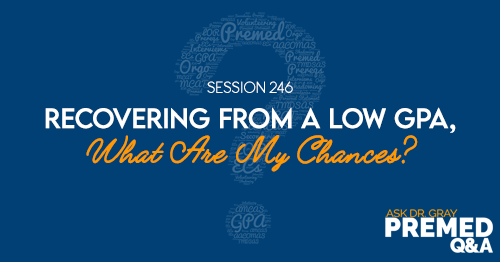Apple Podcasts | Google Podcasts
Session 93

You’re interested in a career that offers the best of both worlds—a few days a week seeing patients and a few days of research – but, is an MD/Ph.D. the best option?
Our episodes are recorded live on Facebook at 3 pm ET on most weekdays. Like the page to be notified.
For more help on your medical school application, check out The Premed Years Podcast.
[00:30] Interest in Research
“I’m writing about the MD/Ph.D. programs and just the expectations from these programs. I am currently a senior in college at the University of New Hampshire. And I have finished all of my prereqs and I did my first research experience this summer at Boston Children’s Hospital. I absolutely loved it so much so that I had always been on the premed track. I relate research to what I do in volunteering and I can make some connection and I want to do both. So I started looking into MD/Ph.D. programs. And just one summer is not enough research.
My GPA is not really at that competitive range. So I decided I’m going to apply to get my master’s in a research-heavy, like molecular and cellular biology program. Right now, I’m sending out some applications to the University of Connecticut, Vanderbilt, etc.
Most of the schools have med schools and they work together for these programs to boost my GPA, which is currently a 3.4 and get some more research experience because I only have that one summer. I was looking at all the stats and got worried thinking that these students have at 516 average MCAT and a 3.7 to 3.85 GPA and over 4,000 hours in the lab. This is what I want to do, but I feel like the stats are just so selective.”
[02:16] Doing Research as an MD
Most students don’t want to do an MD/Ph.D. They just want to be involved in research in some way. So let’s talk about what you envision your career to be in 20 years. How often are you seeing patients? How often are you doing research? Are you in an academic center? Are you in the community? What do you potentially envision your life to be?
What our student wants today is to incorporate research into her career and thinking maybe the MD/Ph.D. program is the best.
I had Dr. Maureen Leonard back on Episode 9 of the Specialty Stories podcast and she was just an “MD.” Dr. Leonard found her passion in research at some point, and she’s making a career for herself as “just an MD.” And now, she’s gone back and got her master’s in a scientific research-oriented degree.
The students who are very strong candidates for MD/Ph.D. programs are those who know that they just love research. They’ve done a ton of research and they have usually found something that they want to research already.
Getting into an MD program is probably going to be easier than an MD/Ph.D. program. Especially when you have a little bit less stellar stats, and not a ton of research hours, or any sort of publications or anything like that.
“MD/Ph.D. is for those super research-heavy students who know what they want to study, they're just super interested and super passionate about it.”Click To TweetThe other thing that students get a little bit swayed by is the fact that school is typically free, and you get a stipend. That’s just not the reason to apply to an MD/Ph.D. program.
[08:35] Don’t Play the Comparison Game
Don’t worry about everyone else, only worry about yourself. You are running your race. Everyone else is running their race and you’re just all doing your thing. So don’t try to play the comparison game because you’ll always lose.
[08:49] Do Her Stats Suggest She Needs to Take a Master’s?
This student started pretty low. She had a 2.7 in the first semester, and then it got up in the low threes. And last semester she got one B, and she’s hoping to get all A’s this semester. And she plans to take the MCAT in August. She’s graduating this semester and plans to go back to her internship and work part-time and study part-time. And then hopefully in the fall, start a master’s program.
With a GPA that has a strong upward trend, I don’t think she needs a Master’s if she’s just applying to medical school. She has shown a great upward trend and it’s a very common issue to start college poorly. But she had shown that she recovered.
[10:20] Other Things to Remember in an MD/Ph.D. Program
If you want to just explore it, then that’s a solid plan if you want to go down the MD/Ph.D. path. But as you’re going through this process, don’t neglect the rest of the application – shadowing, clinical experience, all that fun stuff.
Remember, too, that part of the application for MD/Ph.D. is you have a whole separate Ph.D. essay of 10,000 characters explaining why you want to do research. They want to see that independent critical thinking and that you can develop a hypothesis and you know how to test it.
Finally, the interview process is typically a two-day process versus one day. You spend one day with the researchers interviewing with the researchers for the Ph.D. side of it and then one day for the medical school interview.
It’s great that this student has done her research. She explains that there are also some schools where you can just apply to the MD program first, then to the MD/Ph.D. later on if you decide you want to research. There are also schools where you can submit your application to the MD/Ph.D. Then if you get denied, they can send your application to the MD and you get looked at for that.
[15:03] Recommended Specialties to Shadow
There are so many specialties out there. But try to shadow a general surgeon and try to shadow some of the hospitalists. Get a glimpse of what the surgical world looks like and what the medicine world looks like. Then as you go through that process, you can dive a bit deeper and shadow, say a colorectal surgeon.
“There isn't a right or wrong way to go through the shadowing process. “Click To TweetSome advisors will tell you that you should shadow lots of primary care to show you’re interested in primary care. So that the schools that you apply to that are primary care-focused are going to see that you did lots of primary care. But students shouldn’t play that game. Just go explore what you’re interested in and make the most of it.
Links:
Specialty Stories Episode 9: Interview with Dr. Maureen Leonard
SEARCH SITE
LISTEN FOR FREE











